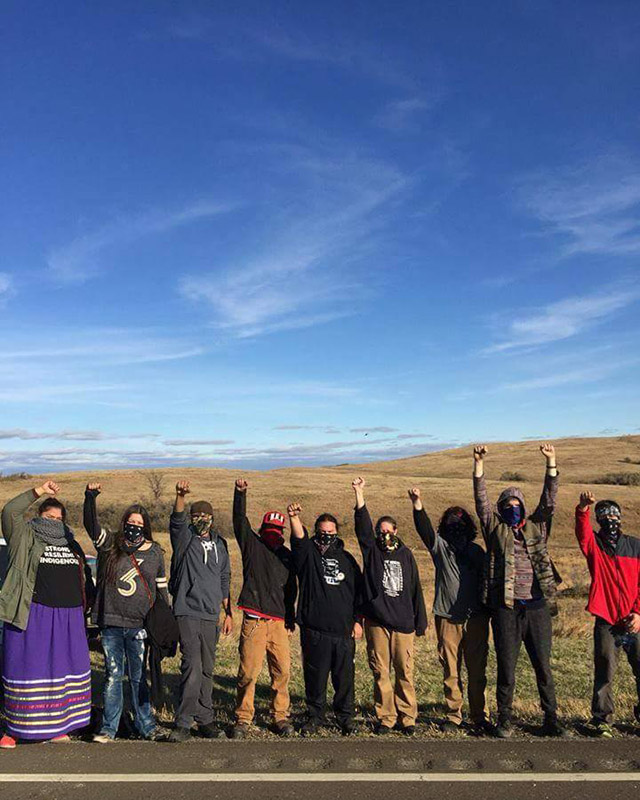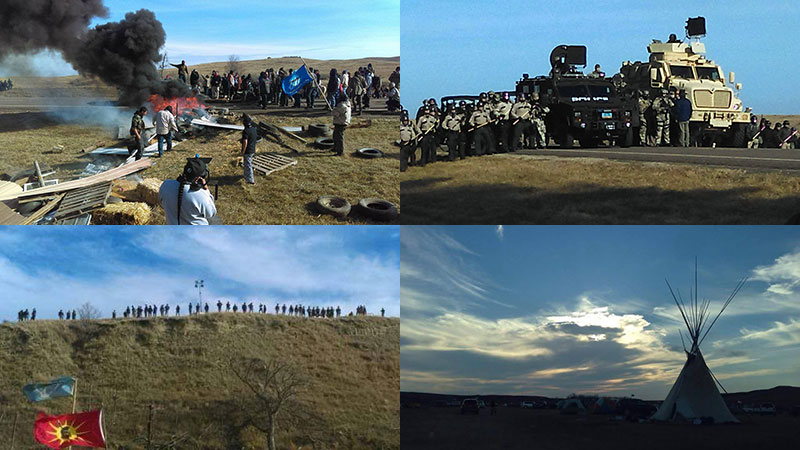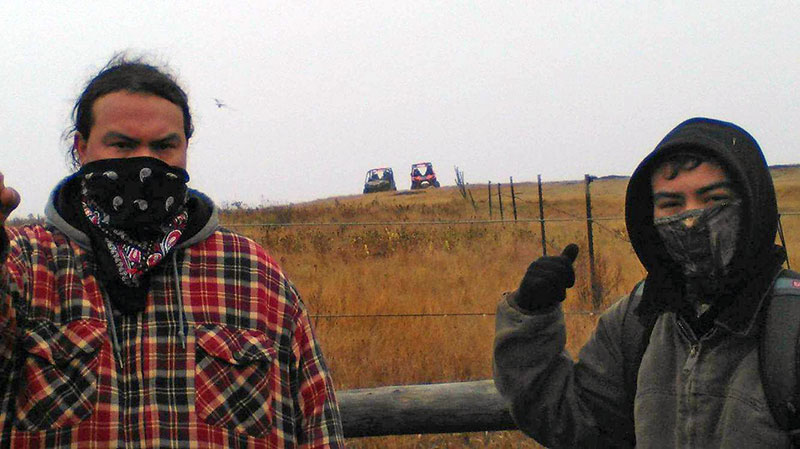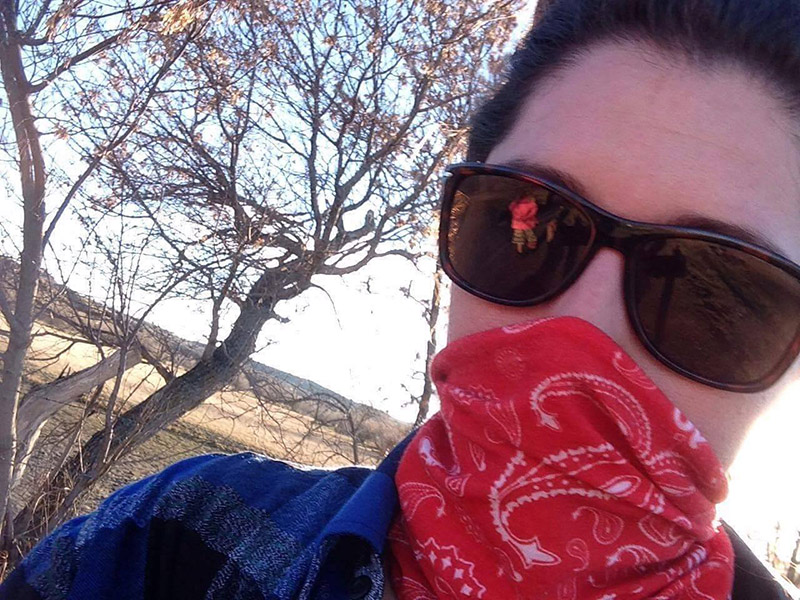Danielle
Danielle “Sissy” McLeod
Ojibwe, Sault Tribe of Chippewa Indians
Bay Mills Indian Community, MI
I’m a single mother of two children, and I feel like what’s happening at Standing Rock affects me because I feel like it will be happening here next, with the Great Lakes.
People who are high up see it as a fight for oil. The Native American community sees it as a fight for water. We all understand that this isn’t going to sustain. Mother Earth is a delicate thing. We’ve all learned this. I see this stuff happening everywhere. In my everyday travels, as just one individual person.
Like Flint. In January, it will be two years that they haven’t had water. Think of all those women and children. I have a friend who just had a newborn. I can’t imagine having a newborn and not having fresh, clean water. Water is life. Everyone needs water.
All the tribes who sent letters of solidarity to Standing Rock? All those letters tell stories of why they’re there, and why they’re standing behind them, and it’s because they all have similar things happening in their own communities.
The pipeline, Line 5, that’s under the Great Lakes is very, very old. Basically, the first 12 hours of an oil spill are the most crucial. If something happened to Line 5, it would take at least seven days to get everything here to clean it up. And that’s if it doesn’t happen in the winter, when the lakes are frozen.
I grew up with my Grandpa, and he was a conspiracy theorist and I never really believed him, but I had his words in my head. But when I went to Standing Rock, I saw it. The media blackout. All the stuff. It just goes to show how many times we’ve been silenced.

I was at Standing Rock from October 31 to November 7. My tribe gave me $200 to get there, for gas. I was there with Wayne [Carrick] and his wife, and there wasn’t any action, until the last day, November 6, when there was an action at Turtle Hill. That hill is filled with the bodies of their loved ones, their ancestors. That’s why it means so much.
I left, and came home, but my heart was still there. I was kind of called to Standing Rock, I guess. I went for my boys, so I could tell them what happened, and for my grandchildren, and in solidarity. I had to go back. I couldn’t think about anything else.
It was probably the most moving experience I’ve ever had. I’ve had two children, I’ve experienced death, suicide. I just knew I needed to go. It gave me strength and a purpose, and I’ve never had anything shake me, or make me grow up, or put me on the right path as fast as this. It made me really center myself and be strong.
I feel like everyone felt the same way, and I really hope that from that comes unity. Solidarity with all tribes. These tribes have been fighting neighboring tribes for years. But if from this, we all come together in unity, it will be an awakening to the United States.
To have 10,000 people fighting for the same cause—it shows how much power we really have. We just need to learn to use it in the right way.
This is a fight for treaty rights and sustainability. But over the years, the media has swept this under the rug. This is about my grandmother, how she was raised in that boarding school. How she raised my father—he was a very abusive alcoholic. A lot of people think all this bad stuff happened years and years ago. It wasn’t that long ago. It affects me. Native Americans have the highest suicide rate of any people, the highest diabetes rate, the highest percentage killed by police, and the lowest longevity rate of any race. The average Native American man only lives to be like, 60. When you read all the stats and you look at it all, it’s alarming to think that we only make up two percent of the world’s population.
With all the atrocities happening at Standing Rock, there are beautiful, beautiful things happening too. Where there’s beauty, there’s pain. You can’t have one without the other. When the pain, suffering, and tear gas pass, we will have unity in the end.
Wayne
Wayne Carrick
Ojibwe
Bay Mills Indian Community, MI
I took my three kids with me. They’re 20, 18, and 16. There were about ten of us together that time, and those kids really worked their butts off. They were going around and building winter structures for elders. They worked a lot of security at checkpoints, making sure people coming in weren’t from DAPL, weren’t drinking. And they were on the frontlines themselves.
They were out there just over a week, and then I had to send them home. They witnessed so much stuff, so much violence. They saw grandmothers being thrown down and maced and shot, and they were so upset. I didn’t have much control of them after that. All they wanted to do was fight. I tried to explain that if you do that, that’s what they want us to do, is fight. And you can inadvertently get a lot of people hurt too. So I sent them back here.
I’ve been following this for a few years. I knew it was going to heat up eventually, but I didn’t know it would be so soon. In September, we had one of our own archaeologists go out there, and they found artifacts, and they submitted paperwork, to make sure the other side saw it and verified it, and immediately they went in and started bulldozing, without even looking. They brought in dogs and started sicking the dogs on people. That’s when I decided I had to come out. I couldn’t take it anymore.

That first time I was there, there was a really good feeling throughout the camp. There was laughter. The only way I can describe it is that it was like how we lived 100, 150 years ago. Everyone worked together. If you had nothing, you’d be taken care of. We stayed there a week, week and a half. Then my funds got low and I had to go. It was hard to leave. I’d never experienced anything like that. Life like that. I’d heard about it. But no social class, nobody above anybody else, everyone working for the same things, taking care of each other. I’ve been looking for that my whole life.
When we got back there in November, there was a different feel to the entire camp. Construction was all the way up to the highway. We all put numbers on our hands, in case we got arrested. It was pretty scary. I didn’t know what to expect. I was marching up there to the frontlines with about 300 people, I had no idea what I was walking into.
I’ve been following treaty violations as long as I’ve been alive. I’ve been wanting to do something my entire life, but I never did, until a year ago we built our own camp near here, in Rexton, to protect our treaty rights there. Then this happened, and we put the focus on Standing Rock, instead of out at Rexton. Especially after those dog attacks.
When I went out there, I wanted to let them know that Bay Mills was supporting them, and that they’re not the only tribe that’s going through this stuff. I met so many people out there, from all over the world, whose countries have been colonized. Everybody’s looking to break away. They’ve been colonized for years. They can’t have their own say, even in their own communities.
I keep hearing people say that [Native Americans] have this big advantage over the rest of America, and we get all this free stuff. I haven’t seen it yet. We’ve got no advantage. Even Standing Rock, they’ve got like a 90% unemployment rate. A lot of reservations around America are like 3rd world countries. Their water’s contaminated, they’re living in like cardboard boxes. They’ve got nothing.
I’ve been talking to people on our Rez here, saying, ‘Get out there. They’ve got no one to stand with them, except us. We have to stand with our brothers and sisters.’ We do a lot, but we can do a lot better. If everybody cared, this wouldn’t even be a fight.
You see a lot of people coming out of Bismarck, holding rallies against Water Protectors, complaining against us, calling us terrorists. Let me tell you something: The first proposed pipeline was going to go north of Bismarck. Your voice mattered. You didn’t want to contaminate your water, so it got moved, down to Standing Rock. We don’t want to contaminate our water either. So why doesn’t our voice matter?
We’ve got to get the US to start upholding their end of the bargain. They wrote the treaties, and they’ve got to start honoring them. It’s federal law, but it keeps getting ignored and ignored. If the federal government started honoring treaties, we wouldn’t have these things like Standing Rock.
With Trump as president, I think it’s going to be really bad for our people out there. He’s invested with it. He’s going to make money off this pipeline. And he has no love for the Native people. I think we’re in for some hard times.
I used to be more democratic, but when I get to thinking about it, treaty violations have occurred on both Republican and Democratic watches. So when I get to thinking about it, I don’t really know where I stand. I mean, Obama has done great things for humanity, but right now, our people are out there and they’re all on the frontline. I don’t even know what’s happening out there.

At Standing Rock there’s this place called the Sacred Fire. It’s the gathering place. They do announcements, people go there and sing. On October 27, with all the action and the violence, they turned it into a makeshift infirmary. They kept bringing in injured people, and putting them on cots. It looked like Wounded Knee. There were 140 of us arrested that day, and the camp changed. There was no more laughter. None.
The smiles on the cops’ faces when they were shooting us were just sickening. Like they were enjoying it. Stupid little smirks–like it was fun.
One day, some women decided to do a water ceremony at the river to pray. About 300 women, 100 or so children, just going to the river to do some praying. When they got there, they were met by 100 cops, and they started shooting rubber bullets at them, and macing them.
The elders at Standing Rock, they call the shots, and they want to remain peaceful. They want to do their civil disobedience, like Ghandi and Martin Luther King. That’s hard to do, just sit there and be peaceful.
But the elders say keep praying and forgive them.
Otherwise you become them.

